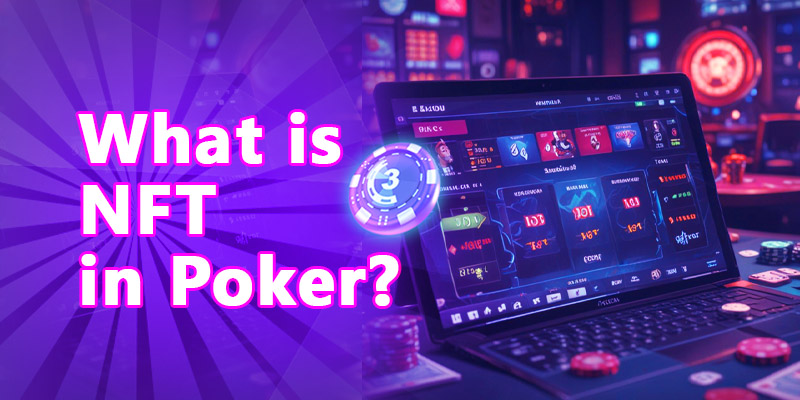
What is NFT in Poker?
In January 2022, the trading volume of NFTs surged to $6.86 billion, more than doubling the previous month's figure.
This remarkable growth underscores the rapid adoption of non-fungible tokens (NFTs) across various industries, including gaming and online poker.
NFTs are unique digital assets verified through blockchain technology, ensuring their authenticity and ownership. Unlike cryptocurrencies such as Bitcoin, which are fungible and identical in value, each NFT is distinct, offering exclusive ownership of digital items like art, music, or in-game assets.
In the realm of online poker, NFTs are beginning to play a transformative role. They offer players the opportunity to own unique digital collectibles, such as exclusive card designs, avatars, or tournament badges, enhancing the gaming experience and providing new avenues for engagement and investment.
As the integration of NFTs into online poker platforms continues to evolve, it's essential to understand their potential impact on the game, the benefits they offer to players, and the challenges that may arise with their adoption.
What is an NFT in Poker?
In January 2022, the trading volume of NFTs surged to $6.86 billion, highlighting the rapid expansion of non-fungible tokens across various industries, including gaming and online poker. This growing trend has captured the attention of poker enthusiasts, game developers, and investors looking for innovative ways to enhance digital gaming experiences. NFTs are unique blockchain-based assets that grant verifiable ownership, making them ideal for applications in the online poker space.
NFTs differ from traditional digital assets because they are indivisible and cannot be replicated. Unlike cryptocurrencies like Bitcoin or Ethereum, which are fungible and interchangeable, each NFT is one of a kind, offering exclusive ownership of a specific digital item. This uniqueness has led to the creation of NFT-based poker collectibles, including digital playing cards, avatars, and exclusive in-game rewards. Poker platforms integrating NFTs allow players to own and trade these assets, creating new opportunities within the online gaming economy.
As NFTs continue to gain traction in poker, they provide an innovative way to merge blockchain technology with traditional gaming. Players can benefit from provable ownership of in-game assets, while developers can monetize digital collectibles in new ways. However, as with any emerging technology, NFTs in poker come with both opportunities and challenges that require careful consideration.
How NFTs Are Used in Poker
NFTs have introduced a new level of ownership and customization to online poker, enabling players to purchase, trade, and showcase unique digital assets. Some poker platforms now offer NFT-based avatars, allowing users to personalize their gaming experience with rare and limited-edition character designs. These avatars often come with exclusive benefits, such as VIP access to tournaments or special gameplay features, creating a sense of prestige and exclusivity within the community.
Beyond avatars, NFTs are being used for poker chips, playing cards, and even digital tournament tickets. Owning an NFT poker chip, for instance, can serve as a status symbol or grant access to private high-stakes games. Additionally, some poker platforms have experimented with NFT-backed game modes, where players can stake their NFTs in matches, adding a layer of strategy and value to online play.
Another emerging application is the tokenization of poker achievements. Players who win major tournaments or complete specific milestones can receive NFTs as trophies, permanently recording their success on the blockchain. This allows for a provable and immutable record of a player's accomplishments, making it easier to showcase achievements across different platforms or even monetize them in secondary markets.
Benefits of Poker NFTs
One of the most significant advantages of poker NFTs is true digital ownership. Traditional online poker platforms rely on centralized systems where in-game assets, such as chips and rewards, are controlled by the operator. With NFTs, players genuinely own their digital assets, meaning they can trade, sell, or transfer them freely without relying on a central authority. This shift gives players more control over their gaming experience and creates opportunities for a decentralized poker ecosystem.
Another key benefit is increased transparency and security. Since NFTs are built on blockchain technology, every transaction is recorded on a public ledger, ensuring provable fairness and authenticity. This reduces the risk of fraud and counterfeit items, which are common concerns in digital gaming. Additionally, blockchain smart contracts can automate various aspects of poker gameplay, such as tournament buy-ins and prize distributions, minimizing the need for intermediaries and ensuring trustless transactions.
NFTs also introduce the concept of play-to-earn in poker, where players can generate real-world value from their in-game activities. By collecting rare NFTs, participating in exclusive tournaments, or trading valuable digital assets, poker enthusiasts can create additional revenue streams beyond traditional cash games. This model is particularly appealing to a new generation of gamers who are looking for ways to blend entertainment with financial opportunities.
Challenges and Risks
Despite their potential, poker NFTs come with several challenges that could hinder widespread adoption. One of the biggest concerns is market volatility. The value of NFTs is largely speculative, meaning prices can fluctuate drastically based on demand and trends. A poker NFT that is highly sought after today could lose its appeal in the future, making it a risky investment for players who are not familiar with the crypto market.
Another challenge is the risk of scams and fraud. As with any new technology, bad actors have taken advantage of the NFT hype by launching fake projects or misleading investors. In the poker industry, players must be cautious when purchasing NFTs, ensuring they are dealing with reputable platforms and verifiable assets. Without proper regulation, it can be difficult to distinguish legitimate poker NFTs from fraudulent ones.
Adoption barriers also exist within the traditional poker community. Many professional and casual players are unfamiliar with blockchain technology, making it difficult to integrate NFTs into mainstream poker platforms. Additionally, regulatory uncertainty surrounding cryptocurrency and NFTs in various countries could pose legal challenges, potentially limiting the availability of NFT-based poker games in certain regions.
 Future of NFTs in Poker
Future of NFTs in Poker
As NFT technology continues to evolve, its integration into the poker industry is expected to expand. More poker platforms are exploring NFT-based rewards, decentralized poker rooms, and blockchain-powered tournaments that offer greater transparency and fairness. Developers are also working on NFT poker ecosystems where players can create, trade, and utilize digital assets across multiple games and platforms, further increasing their utility.
One potential breakthrough is the use of smart contracts to automate poker tournaments and prize pools. By leveraging blockchain-based agreements, poker platforms can ensure fair and tamper-proof gameplay, eliminating concerns about biased operators or delayed payouts. Additionally, the ability to tokenize in-game assets opens up new revenue models for developers, allowing them to create a sustainable poker economy driven by NFT transactions.
However, the future of poker NFTs will largely depend on mainstream adoption and regulatory developments. If poker platforms successfully educate players about the benefits of NFTs while addressing security concerns, this technology could become a permanent fixture in the online gaming industry. Whether as digital collectibles, play-to-earn incentives, or ownership-driven gaming experiences, NFTs have the potential to reshape how poker is played and monetized in the digital age.
Conclusion
NFTs are revolutionizing the poker industry by introducing unique digital ownership, enhanced gameplay experiences, and new economic opportunities. From custom avatars and exclusive tournament access to provable poker achievements, NFTs provide innovative ways for players to engage with the game beyond traditional cash games and tournaments.
However, the road to mainstream adoption comes with challenges. Market volatility, security risks, and regulatory uncertainties could slow down NFT integration in poker. Educating players and ensuring transparency in NFT transactions will be crucial for long-term success.
As blockchain technology continues to advance, the role of NFTs in poker is likely to expand. Whether they become a fundamental part of online poker or remain a niche trend depends on how well the industry adapts to this digital transformation. For now, NFTs present an exciting opportunity for players and developers willing to explore the intersection of poker and blockchain innovation.